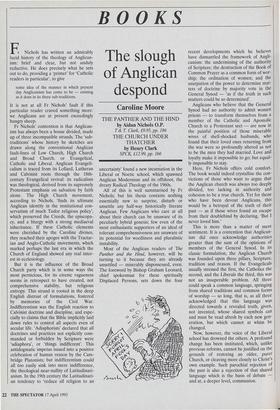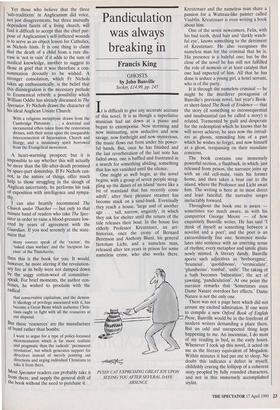BOOKS
The slough of Anglican despond
Caroline Moore
THE PANTHER AND THE HIND by Aidan Nichols O.P. T & T Clark, f9.95, pp. 186 THE CHURCH UNDER THATCHER by Henry Clark SPCK (1 2.99, pp. 166 Fr Nichols has written an admirably lucid history of the theology of Anglican- ism: brief and clear, but not unduly reductive. He does precisely what he sets out to do, providing a 'primer' for 'Catholic readers in particular', to give
some idea of the manner in which present day Anglicanism has come to be — existing as it does in its three sub-traditions.
It is not at all Fr Nichols' fault if this particular reader craved something more: we Anglicans are at present exceedingly hungry sheep.
Fr Nichols' contention is that Anglican- ism has always been a house divided, made up of three incompatible strands. The 'sub- traditions' whose history he sketches are drawn along the conventional Anglican fault-lines of Low Church, High Church and Broad Church, or Evangelical, Catholic and Liberal. Anglican Evangeli- calism is traced from its Lollard, Lutheran and Calvinist roots through the 18th- century Evangelical revival: its radicalism was theological, derived from its supremely Protestant emphasis on salvation by faith alone. The High Church movement, according to Nichols, 'finds its ultimate Anglican identity in the institutional con- servatism of much Tudor religious policy', which preserved the Creeds, the episcopa- cy, and a liturgy with a strong mediaeval inheritance. If these Catholic elements were cherished by the Caroline divines, they reached their apogee with the Tractar- ian and Anglo-Catholic movements, which marked perhaps the last era in which the Church of England showed any real inter- est in ecclesiology.
But it is the influence of the Broad Church party which is in some ways the most pernicious, for its eirenic vagueness seems in retrospect to have created, not comprehensive stability, but religious entropy. This strand is rooted in the deep English distrust of formulations, fostered by memories of the Civil War. Indifferentism was the English reaction to Calvinist doctrine and discipline, and espe- cially to claims that the Bible implicitly laid down rules to control all aspects even of secular life. Adiaphorists' declared that all doctrines and practices not explicitly com- manded or forbidden by Scripture were `adiaphora', or 'things indifferent'. This antidogmatic impetus issued into a positive celebration of human reason by the Cam- bridge Platonists; but indifferentism could all too easily sink into mere indifference, the theological near-nullity of Latitudinari- anism. In the 19th century the Latitudinari- an tendency to 'reduce all religion to an uncertainty' found a new incarnation in the Liberal or Noetic school, which spawned Anglican Modernism and its offshoot, the dreary Radical Theology of the 1960s.
All of this is well summarised by Fr Nichols; but his thesis contains nothing essentially new to surprise, disturb or unsettle any half-way historically literate Anglican. Few Anglicans who care at all about their church can be unaware of its peculiarly hybrid genesis; few even of the most enthusiastic supporters of an ideal of tolerant comprehensiveness are unaware of its potential for woolliness and pluralistic instability.
Most of the Anglican readers of The Panther and the Hind, however, will be turning to it because they are already unsettled — miserably dispossessed, even. The foreword by Bishop Graham Leonard, chief spokesman for these spiritually Displaced Persons, sets down the four recent developments which he believes have dismantled the framework of Angli- canism: the undermining of the authority of Scripture; the destruction of the Book of Common Prayer as a common form of wor- ship; the ordination of women; and the usurpation of the power to determine mat- ters of doctrine by majority vote in the General Synod — 'as if the truth in such matters could be so determined'.
Anglicans who believe that the General Synod had no authority to admit women priests — to transform themselves from a member of the Catholic and Apostolic Church to a Protestant sect — are now in the painful position of those miserable wives of shell-shocked husbands, who found that their loved ones returning front the war were so profoundly altered as not to be the men they had married. Love and loyalty make it impossible to go; but equal- ly impossible to stay.
Here, Fr Nichols offers cold comfort. The book would indeed crystallise the con- victions of those who want to argue that the Anglican church was always too deeply divided, too lacking in authority and cohesion to be a true church. Yet for those who have been devout Anglicans, this would be a betrayal of the truth of their past — as if those wives found an escape from their doublebind by declaring, 'But I never loved him.'
This is more than a matter of mere sentiment. It is a contention that Anglican- ism did once acknowledge authorities greater than the sum of the opinions of members of the General Synod. In its classic formulation, the Anglican Church was founded upon three pillars, Scripture, tradition and reason. If the Evangelicals usually stressed the first, the Catholics the second, and the Liberals the third, this was not an insuperable problem. All three could speak a common language, springing from shared traditions and common forms of worship — so long, that is, as all three acknowledged that this language was directed towards a revealed truth, given, not invented, whose shared symbols can and must be read afresh by each new gen- eration, but which cannot at whim be changed. Now, however, the voice of the Liberal school has drowned the others. A profound change has been instituted, which, unlike previous reforms, cannot be justified on the grounds of restoring an older, purer Church, or cleaving more closely to Christ's own example. Such parochial rejection of the past is also a rejection of that shared language which is the basis of debate and at, a deeper level, communion. Yet those who believe that the three 'sub-traditions' in Anglicanism did voice, not just disagreements, but three mutually dependent facets of a living church, will find it difficult to accept that the chief pur- pose of Anglicanism's self-inflicted wounds is to serve as an object lesson for Catholics, as Nichols hints. It is one thing to claim that the death of a child from a rare dis- ease is 'not in vain' if it adds to the sum of medical knowledge, another to suggest to those in grief that it was therefore a con- summation devoutly to be wished. A stronger consolation, which Fr Nichols takes up enthusiastically, is the belief that this disintegration is the necessary prelude to Ecumenical rebirth: a possibility which William Oddie has already discussed in The Spectator. Fr Nichols draws the character of his ideal Anglican Uniate Church:
With a religious metaphysic drawn from the Cambridge Platonists . . . a doctrinal and sacramental ethos taken from the restoration divines, with their stress upon the inseparable interconnection of Incarnation, Church and liturgy; and a missionary spirit borrowed from the Evangelical movement.
A heart-warming prospect; but it is Impossible to say whether this will actually be more than the life-after-death promised by spare-part donorship. If Fr Nichols can- not, in the nature of things, offer much help to those struggling in the slough of Anglican uncertainty, he performs his task of exposition with intelligence and sympa- thy.
I can also heartily recommend The Church under Thatcher — but only to that minute band of readers who take The Spec- tator in order to raise a blood-pressure low- ered by years of agreement with the Guardian. If you nod serenely at the state- ment that
many sources speak of the 'racism', the 'naked class warfare' and the 'incipient fas- cism' of the Thatcherite,
then this is the book for you. It would, however, be more stirring if the revolution- ary fire in its belly were not damped down by the soggy cotton-wool of committee- speak. For brief moments, the author con- fesses, he wished to proclaim with the radical
that conservative capitalism, and the demon- ic ideology of privilege associated with it, has become a Great Beast which authentic Chris- tians ought to fight with all the resources at our disposal.
But these 'resources' are the manufacture of bumf rather than bombs:
I want to argue for a type of policy-focussed incrementation which is far more realistic and pragmatic than the radicals' permanent revolution', but which generates support for directives instead of merely pointing out directions and urging individual Christians to take it from there.
Most Spectator readers can probably take it from there, and supply the general drift of the book without the need to purchase it.



















































 Previous page
Previous page